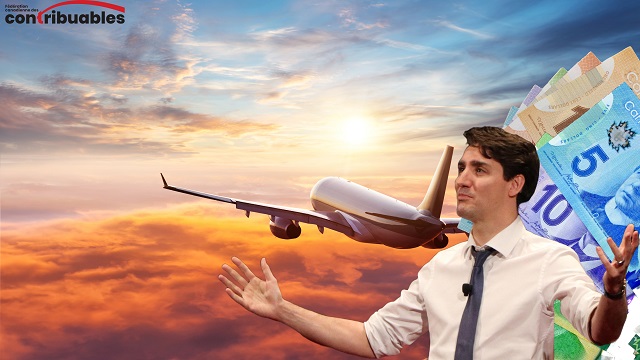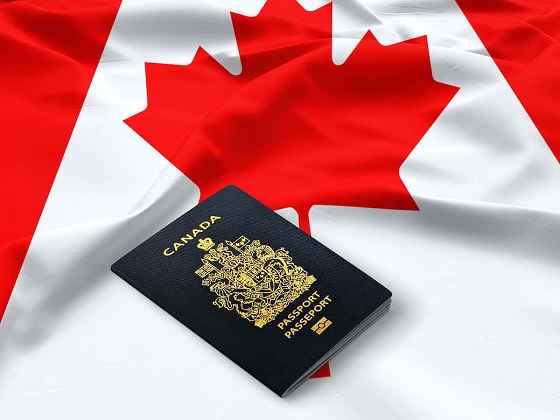National
Trudeau drops nearly $200K on airplane food during six-day trip

From the Canadian Taxpayers Federation
Author: Franco Terrazzano
Prime Minister Justin Trudeau and his entourage dropped $190,000 of taxpayer money on airplane food during a tour of the Indo-Pacific region last fall, according to access-to-information records obtained by the Canadian Taxpayers Federation.
The taxpayer tab was $1.9 million for the six-day trip.
“I guess one way to beat the high cost of groceries in Canada is to take a government work trip and bill taxpayers for fancy airplane food,” said Franco Terrazzano, CTF Federal Director. “For that price, the prime minister could have covered an average family’s grocery bill for almost two decades.”
From Sept. 5-10, 2023, Trudeau toured the Indo-Pacific region, meeting with business leaders in Singapore, the president of Indonesia, the Association of Southeast Asian Nations and attending the G20 Summit in India.
The focus of the trip was “nurturing relationships with Asian leaders and advancing trade talks,” according to a report from the Canadian Press.
Costs for the trip included $427,000 for RCMP security, $643,000 for jet fuel and aircraft handling fees, $422,000 for hotels, $129,000 for ground transportation, and $190,000 for in-flight catering, according to government records obtained by the CTF.
The number of passengers on the government aircraft ranged from 37 to 54 at various legs of the trip. Additional costs included $22,000 for meals and incidentals (on top of the in-flight catering expenses) and $2,500 for gifts.
All told, the trip cost taxpayers $1,908,243. The tab could rise even higher, as the records indicate certain expenses are still being processed.
The $190,000 spent on in-flight catering surpasses the $100,000 Governor General Mary Simon spent on airplane food during her weeklong trip to the Middle East in March 2022.
In the aftermath of the in-flight catering costs for Simon’s trip becoming public, a Parliamentary committee summoned high-ranking government employees to answer for the outrageous tab, and later moved to curb future frivolous spending.
“We recognize that the system that we had in place was not delivering the kind of oversight and control that Canadian taxpayers deserve,” said Stewart Wheeler, who was then Canada’s chief of protocol.
“The government told taxpayers it would cut down on these extravagant trips, but dropping $200,000 on airplane food doesn’t exactly scream fiscal responsibility,” Terrazzano said. “The government is more than $1 trillion in debt, so maybe it could cool it on these expensive international trips.”
The CTF has filed access-to-information requests for the in-flight catering receipts for Trudeau’s September 2023 Indo-Pacific tour.
Automotive
Canadian interest in electric vehicles falls for second year in a row: survey

From LifeSiteNews
Canadians’ disinterest in electric vehicles comes as the Trudeau government recently mandated that all new light-duty vehicles in Canada are zero emission by 2035.
Research has revealed that Canadians are increasingly unwilling to purchase an electric vehicle (EV).
According to an April 22 survey from AutoTrader, Canadians remain skeptical of Prime Minister Justin Trudeau’s electric vehicle mandate and ongoing advertisement surrounding electric vehicles, as interest in owning one dropped for a second year in a row.
“Overall, while almost half of non-EV owners are open to buying an EV for their next vehicle, interest in EVs has declined for the second year in a row,” reported Tiffany Ding, director of insights and intelligence at AutoTrader.
In 2022, at least 68 percent of Canadians were interested in buying an electric vehicle. However, by 2023, the number declined to 56 percent. So far in 2024, there is even less interest, with only 46 percent saying they were open to purchasing one.
“AutoTrader data shows a direct correlation to gas prices and EV interest, and since gas prices have normalized from their peak in 2022, EV interest has also dropped,” a summary of the survey explained.
However, Canadians did show a slight increase of interest in hybrid vehicles, with 62 percent of those looking to purchase an electric vehicle saying they would look at a gas-electric hybrid, compared with 60 percent in 2023.
The survey also questioned Canadians regarding Trudeau’s Zero Emission Vehicle (ZEV) mandate, which requires all new light-duty vehicles in Canada are zero-emission by 2035, essentially banning the sale of new gasoline/diesel-only powered cars.
The mandate comes despite warnings that it would cause massive chaos by threatening to collapse the nation’s power grids.
“Over 75 percent of respondents are aware of the federal government’s ZEV mandate, which requires all new light-duty vehicles sold in Canada to be zero-emission by 2035,” the survey found.
However, the respondents revealed that they believe it’s “unlikely that Canada will be able to meet the federal government’s ZEV target due to the current inadequate charging infrastructure or a change in political power that could revoke or amend the ZEV mandate timeline.”
Canadians’ concerns in buying an electric vehicle include limited travel range/distance, inadequate availability of charging stations, higher purchasing costs, and concerns that they do not perform well in cold weather.
Indeed, this winter, western Canadians experienced firsthand the unreliability of Trudeau’s “renewable” energy scheme as Alberta’s power grid nearly collapsed due to a failure of wind and solar power.
Trudeau’s plan has been roundly condemned by Canadians, including Alberta Premier Danielle Smith. In 2022, Smith denounced a federal mandate that will require all new cars sold after 2035 to be “zero emission” electric (EVs) vehicles and promised that Albertans will always have the choice to buy gasoline-powered cars.
Since taking office in 2015, Trudeau has continued to push a radical environmental agenda similar to the agendas being pushed the World Economic Forum’s “Great Reset” and the United Nations’ “Sustainable Development Goals.”
The reduction and eventual elimination of the use of so-called “fossil fuels” and a transition to unreliable “green” energy has also been pushed by the World Economic Forum (WEF) – the globalist group behind the socialist “Great Reset” agenda – an organization in which Trudeau and some of his cabinet are involved.
The Trudeau government’s electric vehicle plan comes despite the fact Canada has the third largest oil reserves in the world. Electric cars cost thousands more to make and buy, are largely considered unsuitable for Canada’s climate as they offer poor range and long charging times during cold winters and have batteries that take tremendous resources to make and are difficult to recycle.
Business
Ottawa’s capital gains tax hike—final nail in ‘business investment’ coffin

From the Fraser Institute
By Tegan Hill and Jake Fuss
From 2014 to 2022, inflation-adjusted total business investment (in plants, machinery, equipment and new technologies but excluding residential construction) in Canada declined by C$34 billion. During the same period, after adjusting for inflation, business investment declined by a total of $3,748 per worker
According to the recent federal budget, the Trudeau government plans to increase the inclusion rate from 50 per cent to 66.7 per cent on capital gains over $250,000 for individuals and on all capital gains realized by corporations and trusts. Unfortunately, this tax hike will be the final nail in the coffin for business investment in Canada, which likely means even harder economic times ahead.
Canada already faces a business investment crisis. From 2014 to 2022, inflation-adjusted total business investment (in plants, machinery, equipment and new technologies but excluding residential construction) in Canada declined by C$34 billion. During the same period, after adjusting for inflation, business investment declined by a total of $3,748 per worker—from $20,264 per worker in 2014 to $16,515 per worker in 2022.
While business investment has declined in Canada since 2014, in other countries, including the United States, it’s continued to grow. This isn’t a post-COVID problem—this is a Canada problem.
And Canadians should be worried. Businesses investment is key for strong economic growth and higher living standards because when businesses invest in physical and intellectual capital they equip workers with the tools and technology (e.g. machinery, computer programs, artificial intelligence) to produce more and provide higher quality goods and services, which fuels innovation and higher productivity. And as firms become more efficient and increase profits, they’re able to pay higher wages, which is why business investment remains a key factor for higher incomes and living standards.
The Trudeau government’s policies—increased regulation, particularly in the energy and mining sectors (which makes Canada a relatively unattractive place to do business), higher and uncompetitive taxes, and massive federal deficits (which imply future tax increases)—have damaged business investment.
Unsurprisingly, weak business investment has correlated with a weak economy. In the fourth quarter of 2023, real economic growth per person ($58,111) officially fell below 2014 levels ($58,162). In other words, Canadian living standards have completely stagnated. In fact, over the last decade economic growth per person has been the weakest on record since the 1930s.
Instead of helping fix the problem, the Trudeau government’s capital gains tax hike will further damage Canada’s economy by reducing the return on investment and encouraging an exodus of capital from the country. Indeed, capital gains taxes are among the most economically-damaging forms of taxation because they reduce the incentive to invest.
Once again, the Trudeau government has enacted a policy that will deter business investment, which Canada desperately needs for strong economic growth. The key takeaway for Canadians? Barring a change in policy, you can expect harder times ahead.
Authors:
-

 Automotive2 days ago
Automotive2 days agoThe EV ‘Bloodbath’ Arrives Early
-

 CBDC Central Bank Digital Currency1 day ago
CBDC Central Bank Digital Currency1 day agoA Fed-Controlled Digital Dollar Could Mean The End Of Freedom
-

 Frontier Centre for Public Policy1 day ago
Frontier Centre for Public Policy1 day agoHow much do today’s immigrants help Canada?
-

 Alberta9 hours ago
Alberta9 hours agoPrincipal at Calgary Elementary School charged with possession of child pornography
-

 Fraser Institute9 hours ago
Fraser Institute9 hours agoFederal government’s fiscal record—one for the history books
-

 Alberta9 hours ago
Alberta9 hours agoRed Deer Company fined $360,000.00 after 2022 workplace fatality
-

 Brownstone Institute1 day ago
Brownstone Institute1 day agoThe Numbers Favour Our Side
-

 Bruce Dowbiggin9 hours ago
Bruce Dowbiggin9 hours agoIn Toronto The Leafs Always Fall In Spring: 2024 Edition








